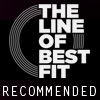"Harlem River Blues"

Harlem River Blues conceivably could be the record that finally causes all of us to quit focusing on Justin Townes Earle‘s famous father and his esteemed namesake, and instead start talking about his considerable songwriting gifts and his inherent ability to craft memorable, deeply affecting music. And hopefully, Earle’s ongoing struggle with addiction that resulted in him canceling his current U.S. tour and checking into rehab won’t overshadow the fact that he made the best album of his young, burgeoning career. The record is at once timeless while also being entirely rooted in the toils of modern urban living; with Earle both echoing and honoring his musical heroes while also adding a deeply personal chapter to the ever-growing collection of stirring, poignant Americana releases.
The rousing swing of the title-track gets the record off to a strong start, with Earle’s smooth, confident vocals joining in the jubilant choir that kicks in during the irresistable chorus, all of which belies the tragic nature of lyrics dealing with drowning to death in a dirty river. Throughout the album, Earle demonstrates his innate talent of writing candidly about his inner-city lifestyle while also threading those stories delicately into country and blues melodies that typically don’t mesh well with such contemporary concerns. But under Earle’s steady hand, these songs all have a haunting, immutable quality that not only makes them unforgettable but also allows the listener to personalize them in their own way, keeping the spirit and raw emotions of the tracks with them long after they’ve stopped listening.
‘One More Night In Brooklyn’ is akin to Ryan Adams’ ‘Hotel Chelsea Nights,’ in that they are two beautiful songs written about wretched living arrangements that the characters are either too tired or too broke to move away from. Conversely, ‘Move Over Mama,’ just bristles with energy, driven by a lively organ line and Earle’s exuberant vocals. ‘Working For The MTA’ (featuring the pedal steel guitar of Calexico’s Paul Niehaus) takes a wistful look at hard living and harder work, but within the song is a highly suggestive verse that perhaps symbolizes the different, darker path Earle has taken in the music industry when compared to his father: “This ain’t my daddy’s train, momma, I ain’t seen the sun in days.’ And indeed, Earle has carved out his own distinct space and sound within Harlem River Blues, where he gives a nod to his influences and inspirations but also imbues these songs with his own unique takes on how to make it through the muddle of daily life.
Earle candidly touches on his substance abuse on ‘Slippin’ And Slidin,’ bluntly stating: “Why do I try my luck? I should never touch the stuff. But it shouldn’t make any difference, Lord, as long as I keep up appearances.” In light of how he recently came off the rails in Indianapolis, this song proves to be heartbreakingly prescient, especially since Earle had to cancel a whole bunch of shows as a result of his addiction. But there is an encouraging sense of redemption and recovery within these songs as well, like in the plaintive ‘Christchurch Woman,’ “It’s early evenin,’ so there’s hope for a better day.” Let’s just hope that Earle is able to deal with his demons effectively and experience these better days, eventually getting back to a good point in his life where he can share his substantial gifts with all of us again.
The album draws to a close with the harmonica-driven blues of ‘Ain’t Waitin,’ a front-porch stomping singalong that works due to its simplicity and uncomplicated production, and ‘Rogers Park,’ a somber, Springsteen-esque number that closes out the record in a beautiful, moving manner. It’s truly a gorgeous song, guided along by a highly evocative piano line and Earle’s pensive lyrics and emotional vocals, reminiscing about a place that has grown fonder simply by his moving further away. With Harlem River Blues, Justin Townes Earle has fully realized the singular promise hinted at with his earlier releases and strong bloodlines, and hopefully he can deal with his destructive habits effectively, and continue to flourish as an artist who is finally starting to come into his own.
Get the Best Fit take on the week in music direct to your inbox every Friday

MF Tomlinson
Die To Wake Up From A Dream

Gwenno
Utopia

KOKOROKO
Tuff Times Never Last






